Politics
Türkiye, TRNC deepen cooperation in security, digital governance
Türkiye and the Turkish Republic of Northern Cyprus (TRNC) explore ways to enhance cooperation on the 51st anniversary of a key Turkish operation to protect Turkish Cypriots against Greek Cypriot attacks.
Turkish Vice President Cevdet Yılmaz on Saturday met with TRNC President Ersin Tatar at the Presidential Complex in Lefkoşa (Nicosia) and discussed efforts to boost bilateral cooperation.
In a post following the meeting, Yılmaz said they discussed “steps to further strengthen Türkiye-TRNC relations in every field,” as well as regional developments, future economic cooperation and digital transformation in public services.
Turkish Vice President Yılmaz also attended a Türkiye-TRNC police service vehicle handover ceremony.
In his speech, Yılmaz said they proudly marked the 454th anniversary of the conquest of Cyprus, as well as the founding anniversaries of the Turkish Resistance Organization and the Security Forces Command, celebrated on Aug. 1 as the Day of Social Resistance.
He emphasized that under President Recep Tayyip Erdoğan’s leadership, Türkiye continues to stand by the Turkish Cypriots in all areas-from education and health care to transportation, infrastructure, energy and agriculture. Yılmaz noted that Türkiye-TRNC cooperation includes sharing expertise in public services, coordination during natural disasters and the provision of equipment and vehicles. “Under the spirit of Türkiye-TRNC cooperation, we are putting 29 new vehicles into service today – 24 service vehicles and five fire trucks,” he said. “Of the 24 police service vehicles we donated, 12 were supplied under the Financial Support Program.”
Yılmaz said that, in addition to the vehicles, 19 types of technical equipment, fingerprint scanners, mobile systems, IT infrastructure support and uniforms for motorcycle police were also provided, enhancing both institutional capacity and working conditions in the field. “A central unit has been established. With GöçNet integration and six mobile migration vehicles, border security in the TRNC is now much stronger, and efforts against irregular migration are far more effective, just as we are intensifying this fight in Türkiye,” he added.
The vice president also attended the opening of the TRNC Earthquake Monitoring and Assessment Center in the capital, established with the support of Türkiye’s Disaster and Emergency Management Authority (AFAD).
Yılmaz said they take pride in AFAD’s work and emphasized that Türkiye’s technical expertise will be shared with the TRNC. Noting that both countries lie in seismic zones, he stressed the importance of managing all phases of an earthquake effectively. Yılmaz also posted on X that the center, strengthened with nationally developed software, has brought the TRNC a science-based and data-driven earthquake analysis infrastructure.
“The system offers not only monitoring, but also critical capabilities for early warning, damage assessment and crisis management,” he noted.
TRNC President Ersin Tatar, also speaking at the opening ceremony, emphasized the importance of disaster preparedness across all institutions and thanked Türkiye for its steps to enhance the TRNC’s capacity. Highlighting the center’s value, Tatar said: “We can cooperate with the Greek Cypriot administration in all areas, especially in response to natural disasters. This center established in the TRNC has greatly supported us. I thank all those involved.”
Politics
Türkiye irks Greece with new maritime moves, Italy, Libya ties
Türkiye and Greece have been historic foes, wrangling for influence in their immediate region. The countries recently sought to set their hostilities aside, but Ankara remains committed to preserving its maritime sovereignty in the face of a dispute with Athens over the Aegean Sea, which sits between the two countries.
Ankara announced on Saturday the designation of marine protection areas, reciprocating an earlier move by Athens that defined its marine preservation parks in the Aegean. The announcement, coupled with a tripartite summit between Turkish, Libyan and Italian leaders on Friday in Istanbul, made waves in the Greek media while the opposition decried the Greek government’s inaction against Türkiye’s rising clout.
Newly designated Marine Protected Areas (MPAs) have been officially recorded on a map registered with the Intergovernmental Oceanographic Commission (IOC) of UNESCO, according to diplomatic sources.
The updated map, prepared by the Ankara University National Research Center on Maritime Law (DEHUKAM) in coordination with relevant institutions, was submitted to the IOC last month. It includes two prominent new MPAs: one off the coast of Northern Aegean and another between Fethiye and Kaş in the Mediterranean. Additional protected areas in Türkiye’s surrounding seas are also expected to be announced.
The MPAs are intended to preserve marine ecosystems and introduce environmental safeguards, Turkish sources said. They emphasized that these zones will not affect the freedom of navigation. Coordination on legal frameworks and the status of the MPAs is ongoing between the Ministry of Agriculture and Forestry and the Ministry of Environment, Urbanization and Climate Change. Previously, the latter declared the Finike Underwater Mountains a Special Environmental Protection Area, a decision published in the Official Gazette on Aug. 16, 2013.
With the addition of the Fethiye-Kaş MPA, Türkiye is expanding its network of protected areas in the Mediterranean, underscoring its commitment to marine conservation.
To enhance inter-agency coordination and further develop Türkiye’s marine spatial planning, first announced in April and registered with the IOC in June, a Presidential Circular established the “Marine Spatial Planning Coordination Board,” published in the Official Gazette on July 24, 2025.
The board is tasked with regularly assessing the environmental impact of sectoral activities at sea and ensuring inter-institutional cooperation. The Ministry of Foreign Affairs will serve as the board’s secretariat and oversee implementation efforts.
Diplomatic sources noted that marine parks are vital tools for protecting specific sea areas while promoting sustainability. They said Türkiye aims to expand the number of these areas based on its experience in marine environmental protection.
Commenting on Greece’s July 21 declaration of two marine parks in the Ionian and Aegean seas, Turkish sources reiterated Ankara’s stance: “It is well known that Türkiye will not accept Greece’s unilateral actions or the creation of faits accomplis in the Aegean.”
They stressed that any activities involving geographical formations not ceded to Greece under international treaties, such as islands, islets and rocks, also known as “gray zones,” have no legal validity and do not affect Türkiye’s legitimate rights and interests.
These issues, sources said, have been repeatedly communicated through diplomatic channels and registered officially by the Turkish Foreign Ministry. The same points are consistently raised in meetings with Greek counterparts.
They added that Türkiye has taken reciprocal steps, including the public disclosure and international registration of its Marine Spatial Planning for all its seas in recent months.
Marine protected areas have now been declared off Gökçeada in the northern Aegean and off Finike in the Mediterranean, the sources confirmed, and both have been integrated into Türkiye’s Marine Spatial Planning map.
Looking ahead, Türkiye intends to increase the number of MPAs in all its seas without hindering economic activity, in line with international maritime law, which encourages cooperation among coastal states – especially in semi-enclosed seas like the Aegean.
While continuing to monitor developments and take corresponding actions, Türkiye maintains its call for dialogue with Greece. The Turkish government upholds its commitment to resolving disputes based on international law, fairness and good neighborly relations, as outlined in the Athens Declaration on Friendly Relations and Good Neighborliness, signed by President Recep Tayyip Erdoğan and Greek Prime Minister Kyriakos Mitsotakis on Dec. 7, 2023.
The Greek Foreign Ministry said in a statement on Saturday that the announcement of “parks in undelimited areas beyond Turkish territorial waters constitutes an unacceptable, unilateral and illegal act.”
“The Greek government consistently and resolutely safeguards the rights of our country and the sustainability of our seas. It also reminds that reactive moves devoid of substance jeopardize the good neighborly relations between the two countries,” the Greek ministry said.
Greek opposition party Syriza, meanwhile, accused the government of “downgrading Turkish provocations” and urged Athens to “take appropriate diplomatic action.”
After a long period of tensions marked by disputes over irregular migration, the Cyprus dispute, energy exploration and territorial sovereignty in the Aegean, Ankara and Athens have been taking confidence-building steps for a fragile normalization of their relations since late 2023.
The normalization sustained momentum in the past two years, with talks between leaders as well as sporadic high-level meetings of top officials to discuss sources of disputes.
Yet, both countries stand firm in their maritime rights, which are still not fully agreed upon after decades of hostilities dating back to the post-World War I period.
Turkish diplomatic power
Another highlight in Türkiye for Greece was a previously unannounced summit between President Erdoğan, Italian Prime Minister Giorgia Meloni and Libyan Prime Minister Abdul Hamid Mohammed Dbeibah in Istanbul’s exquisite Dolmabahçe Palace. The surprise summit held far from the capital, focused on energy exploration in the Mediterranean, irregular migration and the political process to restore stability in Libya, issues with immediate relevance for Greece. Greece is the main gateway to Europe for many irregular migrants, while Athens is eager for energy exploration in the Mediterranean despite objections by Türkiye, especially in maritime zones with disputed borders and near Cyprus.
Greek opposition claimed Türkiye started steering developments in the region and elevated its diplomatic role, while the Greek government lacked a strategy. Greek media, meanwhile, questioned why the government did not join the summit, as Greece was at the heart of irregular migration concerns.
Friday’s summit addressed migration and regional cooperation among other topics, according to a statement by the Turkish Presidency’s Directorate of Communications. The directorate said on Friday that Erdoğan underlined the importance of joint efforts by Türkiye, Italy and Libya in addressing the challenges facing the Mediterranean basin, including irregular migration. He stressed that long-term, sustainable solutions are needed to tackle the root causes of irregular migration, calling for greater multilateral coordination.
It was agreed that cooperation committees would convene first, followed by a leaders’ meeting to review decisions taken.
It was decided during the summit that the leaders would meet to discuss the decisions taken following the convening of the cooperation committees, the statement noted.
Libya’s Government of National Unity also issued a statement after the summit, stating that the talks addressed regional cooperation, stability and economic integration in the Mediterranean, emphasizing the importance of supporting joint strategic projects. The statement noted that economic cooperation opportunities were also discussed at the summit.
It emphasized the importance of connecting Libya to regional projects in the Mediterranean, as well as strengthening partnerships in energy, oil and gas, and infrastructure; investing in ports; developing electricity networks; and supporting joint strategic projects.
Noting Dbeibah’s call for increased regional coordination in combating smuggling networks and illegal activities at the summit, the statement said the Libyan premier also urged a quadripartite ministerial meeting consisting of Libya, Türkiye, Italy and Qatar to initiate joint projects in this regard and to combine efforts on priority issues.
In a statement, the Italian government said that Meloni, Erdoğan and Dbeibah discussed strengthening cooperation to address common challenges, beginning with the management of irregular migration flow. During the meeting, Meloni emphasized “the excellent results achieved in this regard with Türkiye,” as well as the opportunity to build on the lessons learned, including by applying them to support the Libyan Government of National Unity’s migration efforts.
“In this context, President Meloni discussed with her interlocutors a series of measures to fight international criminal networks of human traffickers, improve work to prevent irregular movements, and support Libya in managing the migration pressure it is facing,” it added.
The statement mentioned that Meloni also reaffirmed Italy’s commitment to Libya’s stability, unity and independence, as well as its support for a political process led by Libya and facilitated by the United Nations that can result in elections. The three leaders agreed to immediately resume work on a technical level to identify concrete actions to be carried out collaboratively within a clearly defined time frame.
Politics
Türkiye must brace if Israel-Iran war flares up again: Report
Türkiye must develop a multifaceted strategy to be prepared in case another war flares up between Israel and Iran, a new report from the National Intelligence Academy (MIA) has warned.
In its report, titled “The 12-Day War and Lessons for Türkiye,” the MIA analyzed the June 13-24, 2025 conflict between Israel and Iran, detailing its military, intelligence, political and technological dimensions while outlining strategic takeaways for Ankara.
The short but intense war, which quickly shook regional balances, was assessed from a broad perspective, from air superiority to cyberattacks, and from manipulation of public opinion to implications for the defense industry. The study also examined the likely trajectory of the Iran-Israel rivalry and set out measures Türkiye should adopt in preparation for potential scenarios.
The report underscored that Türkiye’s defense industry has become a priority target for foreign intelligence services and urged the adoption of preventive security policies to safeguard sector actors. It stressed that critical personnel training, early warning systems and digital protection measures will be decisive in future wars.
According to the MIA, the 12-day war was a striking example of new-generation warfare capable of producing profound effects in a short span. The conflict began with Israeli surprise airstrikes and assassination operations, culminating in U.S. strikes on Iranian nuclear facilities.
The report highlighted the decisive role of modern warfare technologies, especially airborne elements, and emphasized the growing importance of cyberwarfare, electronic attacks and digital manipulation of public opinion.
Israel’s long-standing intelligence and operational networks inside Iran were described as a key factor in its military successes, illustrating how modern intelligence structures can directly shape the course of war.
Lessons for Türkiye
The report noted that Iran tried to offset Israel’s advantages through advanced hypersonic missile capabilities but achieved limited results against Israel’s layered air defense systems.
Even so, Israel’s difficulty in intercepting these missiles despite its technological edge demonstrated, the report said, the need for Türkiye to prepare for similar threats by modernizing its air defenses and boosting anti-missile capabilities.
The war was also fought in the digital sphere. Both sides carried out cyberattacks to damage infrastructure and sway public opinion. Iran’s blocking of platforms such as WhatsApp revealed the psychological dimensions of such conflicts, reinforcing the importance for Türkiye of digital security, critical infrastructure protection and domestic software use.
Civil defense capacity
Civilian casualties in Iran, particularly in Tehran, were attributed to inadequate early warning systems and shelter infrastructure. In contrast, Israel avoided similar losses thanks to advanced civil defense systems.
The MIA stressed that Türkiye should develop comparable capabilities for its major cities, warning that civil defense capacity will be vital in any future conflict.
The report reaffirmed the importance of integrating manned and unmanned aerial systems in Türkiye’s air force and called for domestic solutions for military use of civilian technologies. It also stressed the need to boost mass production capacity and adopt long-term, multifaceted defense planning.
If diplomacy in Iran fails, the report cautioned, regional instability will be unavoidable, potentially triggering mass migration toward Türkiye, disrupting energy supplies and creating border security risks.
The conclusion was that Türkiye must be ready for these eventualities, militarily, digitally and strategically.
Politics
FM Fidan, Saudi counterpart discuss Palestinian statehood
Foreign Minister Hakan Fidan and Saudi Foreign Minister Prince Faisal bin Farhan Al Saud discussed the situation in Gaza and steps to be taken for the recognition of Palestinian statehood in a phone call on Friday, foreign ministry sources said.
The two foreign ministers also discussed the steps that could be taken toward the recognition of the State of Palestine within the framework of the resolution adopted by the U.N. General Assembly.
On Thursday, Türkiye welcomed recent steps taken to recognize a Palestinian state by France, Britain, Canada and others.
The moves have come as international concern and criticism have grown as starvation and famine are taking place in Gaza and Palestinians are not getting food due to the Israeli blockade.
The leading international authority on hunger crises this week said Israel’s military offensive and blockade have led to the “worst-case scenario of famine” in the territory.
Last week, French President Emmanuel Macron announced his country, a heavyweight in the EU, would officially recognize a Palestinian state at the United Nations General Assembly in September, becoming the first major Western power to do so.
About 144 of the 193 member states of the U.N. recognize Palestine as a state, including most of the global south as well as Russia, China and India.
Fidan and his Saudi counterpart also exchanged views on the latest situation in Syria, the sources said.
Türkiye and 10 Arab countries recently reiterated their commitment to Syria’s sovereignty, unity, stability and security, denouncing foreign interference and condemning ongoing Israeli strikes.
Ankara also played a key role in establishing the cease-fire in Syria after Israeli airstrikes targeted the capital, Damascus, as well as Suwayda and Daraa, on the pretext of protecting the Druze community.
Türkliye views Syria as a neighbor it intends to stand by during its reconstruction and reintegration into the international fold.
Politics
Erdoğan urges Gaza cease-fire in talks with Italy, Libya leaders
President Erdoğan called for an urgent cease-fire in Gaza and renewed support for a Palestinian state based on 1967 borders during a trilateral summit in Istanbul with Italy’s Prime Minister Giorgia Meloni and Libya’s Prime Minister Abdul Hamid Dbeibah, also addressing migration and regional cooperation, the Presidential Communications Directorate said.
The summit focused on cooperation between the three countries and regional issues.
During the meeting, Erdoğan underlined the importance of joint efforts by Türkiye, Italy and Libya in addressing the challenges facing the Mediterranean basin, including irregular migration. He stressed that long-term, sustainable solutions are needed to tackle the root causes of irregular migration, calling for greater multilateral coordination.
It was agreed that cooperation committees would convene first, followed by a leaders’ meeting to review decisions taken.
Highlighting Israel’s genocidal attacks in Gaza and the ongoing humanitarian tragedy, Erdoğan reiterated that the international community bears a major responsibility to ensure an immediate cease-fire and swift delivery of humanitarian aid to the region. He emphasized that a lasting solution can only be achieved through the establishment of an independent, sovereign and geographically contiguous State of Palestine within the 1967 borders, with East Jerusalem as its capital.
It was decided during the summit that the leaders would meet to discuss the decisions taken following the convening of the cooperation committees, the statement noted.
Rejecting international calls for a ceasefire, the Israeli army has pursued a brutal offensive on Gaza since Oct. 7, 2023, killing more than 60,000 Palestinians, most of them women and children. The relentless bombardment has destroyed the enclave and led to food shortages.
Libya’s National Unity Government seeks support for joint strategic projects
Libya’s Government of National Unity also issued a statement after the summit, stating that the talks addressed regional cooperation, stability, and economic integration in the Mediterranean, emphasizing the importance of supporting joint strategic projects.
The statement noted that economic cooperation opportunities were also discussed at the summit.
It emphasized the importance of connecting Libya to regional projects in the Mediterranean, as well as strengthening partnerships in energy, oil and gas, and infrastructure; investing in ports; developing electricity networks; and supporting joint strategic projects.
Noting Dbeibah’s call for increased regional coordination in combating smuggling networks and illegal activities at the summit, the statement said the Libyan premier also urged a quadripartite ministerial meeting consisting of Libya, Türkiye, Italy, and Qatar to initiate joint projects in this regard and to combine efforts on priority issues.
Politics
Italy praises Türkiye’s cooperation in migration management
Italy on Friday hailed Türkiye’s cooperation in curbing irregular migration, saying it has delivered “excellent results,” according to an official statement.
In a statement, the Italian government said that Italian Prime Minister Giorgia Meloni, Turkish President Recep Tayyip Erdoğan, and Prime Minister of Libya’s National Unity Government Abdul Hamid Dbeibah discussed strengthening cooperation to address common challenges, beginning with the management of irregular migration flow.
It came during the three leaders’ trilateral summit in Istanbul.
During the meeting, Meloni emphasized “the excellent results achieved in this regard with Türkiye,” as well as the opportunity to build on the lessons learned, including by applying them to support the Libyan Government of National Unity’s migration efforts.
“In this context, President Meloni discussed with her interlocutors a series of measures to fight international criminal networks of human traffickers, improve work to prevent irregular movements, and support Libya in managing the migration pressure it is facing,” it added.
The statement mentioned that Meloni also reaffirmed Italy’s commitment to Libya’s stability, unity, and independence, as well as its support for a political process led by Libya and facilitated by the United Nations that can result in elections.
The three leaders agreed to immediately resume work on a technical level to identify concrete actions to be carried out collaboratively within a clearly defined time frame.
According to a statement from Türkiye’s Communications Directorate, the Turkish president emphasized the importance of cooperation among the three countries in addressing the Mediterranean region’s challenges, including irregular migration movements.
Following the summit, Libya’s Government of National Unity issued a statement, stating that the meeting addressed regional cooperation, stability, and economic integration in the Mediterranean, stressing the importance of supporting joint strategic projects.
Politics
Greece’s island militarization raises red flags for Türkiye
Greece on Monday announced radical plans to deploy what it called “self-sufficient” army units on the Aegean islands, some of which sit as close as 1,575 meters (5,165 feet) to Türkiye. The plan, part of the so-called “Agenda 2030,” aims to make front-line formations nearly autonomous, capable of growing their own food, generating their own energy and operating without needing orders or resupply from central command.
The move, primarily meant to counter Turkish elements while ensuring Greek supervision in the Aegean, raises several red flags for Türkiye and carries the risk of tempting a response that could upend already fragile balances between the Eastern Mediterranean neighbors.
Turkish defense experts argue Athens’ move, on islands that are required to remain demilitarized under international treaties, goes beyond a defensive upgrade and ventures into an aggressive posture aimed at Türkiye.
Retired Rear Adm. Cihat Yaycı, a prominent architect of Türkiye’s maritime doctrine “Blue Homeland,” called the plan “a clear violation of international law” and a “new manifestation of Greece’s lawless approach.”
The 1923 Treaty of Lausanne and the 1947 Paris Peace Treaty granted Greece sovereignty over 23 islands only on the strict condition that they would remain non-military in status.
“Greece has violated the very condition under which sovereignty was transferred,” he said in an exclusive interview with Daily Sabah, pointing to the deployment of military assets, airports, tanks and anti-drone systems as illegitimate.
“These developments must be read not as isolated defense upgrades but as part of a larger effort to undermine the non-military status of the islands through the use of civilians and pseudo-civilian structures,” Yaycı added. “This opens the door to contesting Greek sovereignty over these islands under international law.”
While Türkiye has long expressed concern over the militarization of islands in the Aegean, Yaycı emphasized that the new Greek doctrine signals an unprecedented shift toward operational independence, evoking not just legal concerns but potential security threats.
“This step by Greece constitutes a direct sign of aggression,” he said. “It has nothing to do with good neighborly relations or alliance solidarity within NATO.”
Echoing this assessment, Murat Aslan, a security analyst at Turkish think-tank Foundation for Political, Economic and Social Research (SETA) and former Turkish military officer, noted that the concept of “autonomous army units” poses a serious risk to Türkiye’s regional security.
“If any of these islands, especially those legally defined as demilitarized, are militarized under the guise of autonomous army units, it’s both unacceptable and dangerous for Türkiye,” Aslan told Daily Sabah. “Such moves could eventually interfere with maritime trade and freedom of navigation in the Aegean.”
Pattern of provocations
After a long period of tensions marked by disputes over irregular migration, the Cyprus dispute, energy exploration and territorial sovereignty in the Aegean, Ankara and Athens have been taking confidence-building steps for a fragile normalization of their relations since late 2023.
The normalization sustained momentum in the past two years, with talks between leaders as well as sporadic high-level meetings of top officials to discuss sources of dispute.
Yet, both countries stand firm in their maritime rights, which are still not fully agreed upon after decades of hostilities dating back to the post-World War I period.
The two experts argued that the Greek plan fits a larger pattern of provocations.
“Greece has doctrinally rehearsed offensive operations,” Aslan said, referencing recent military exercises involving amphibious landings on Türkiye’s western coast.
“If a country is purchasing equipment designed for breaching defenses rather than building them, that says a lot about their intentions,” he said.
Aslan pointed out that Greece has recently procured thousands of armored vehicles and advanced systems from the United States and Germany, often at no cost, through EU and NATO grants.
“Greece, rather than fighting with Türkiye, has a method of strengthening its defense without spending money and at the same time gaining the political support of other states, in other words, obtaining a security guarantee by ‘making a fuss,’” Aslan explained.
He said Greece’s strategy is to portray Türkiye as a threat, thereby securing foreign political guarantees and defense aid.
“They strengthen their defense posture without spending money and gain international backing in the process,” he said.
Countermeasures
Yet, for Ankara, the threat may be less about Greece’s actual military capacity and more about how these developments shift the political and legal playing field.
“Türkiye doesn’t perceive Greece as a current threat but rather a risk, especially if such maneuvers continue as a fait accompli,” Aslan explained. “It’s not just about matching moves militarily. It’s about protecting national rights under international law.”
Yaycı underscored this legal dimension, urging Türkiye to invoke Article 60 of the 1969 Vienna Convention on the Law of Treaties, which deals with reactions against treaty breaches and allows parties to suspend or terminate a treaty in response to prior violations by another party.
Invoking Article 60 would transform the Aegean islands issue from an ongoing diplomatic grievance into a formal treaty breach dispute with legal, territorial and possibly military implications. It would be one of the most serious legal steps Türkiye could take short of direct action.
“It’s time Türkiye loudly and unequivocally declares that Greece’s actions constitute such a breach,” Yaycı said, adding that Ankara should pursue legal, diplomatic, and if necessary, military countermeasures.
Türkiye’s military, he noted, is already well-positioned.
“We are among the top countries in defense exports, with advanced surveillance, command and weapons systems,” Yaycı said. “Türkiye is in the Super League; Greece is still playing in the amateur division.”
Beyond the bilateral tension, the Greek redeployment could also shake NATO cohesion in the region.
Both experts expressed concern that Greece’s growing defense ties with the United States and France might be used to reposition NATO’s eastern flank around Türkiye, effectively isolating Ankara.
“Greece’s cooperation with third countries on demilitarized islands contradicts NATO’s founding principles,” Yaycı warned. “It threatens alliance trust and undermines the balance in the Eastern Mediterranean. It may be an indirect attempt to push Türkiye out of the European and trans-Atlantic defense space.”
Aslan also pointed to the strategic significance of recent U.S. deployments in Greece, especially around Alexandroupoli (Dedeağaç), located just 40 kilometers (24.86 miles) from Türkiye’s border.
“The risk is that these forward bases are being positioned as part of a broader deterrence line, one not necessarily aimed at Greece’s defense but at Türkiye’s containment,” he said.
Still, Aslan cautioned against overreaction.
“Türkiye has many pressing regional issues, Syria, the Caucasus, the Russia-Ukraine war. Greece is just one piece of the puzzle,” he said. “But if Athens turns militarization into a long-term strategy, Türkiye will act, legally, diplomatically, and if required, operationally,” he said.
-

 Sports3 days ago
Sports3 days agoPiastri, Norris go head-to-head as McLaren leaves Verstappen in dust
-

 Lifestyle3 days ago
Lifestyle3 days agoCopenhagen: Scandinavia’s vibrant capital of happiness
-
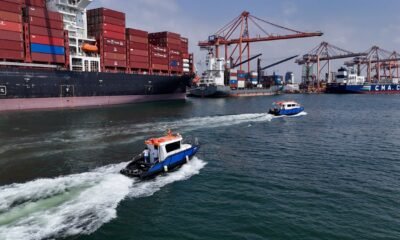
 Economy3 days ago
Economy3 days agoTürkiye says still holds favorable status despite higher US tariffs
-
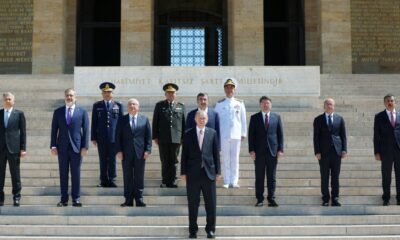
 Politics3 days ago
Politics3 days agoTürkiye set for major conventional reshuffle in top military brass
-
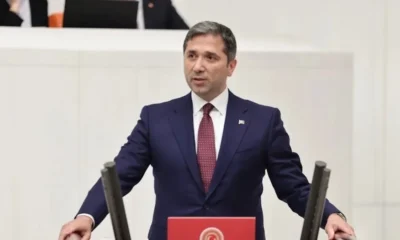
 Daily Agenda3 days ago
Daily Agenda3 days ago‘Expatriate’ response to Tanal and Enginyurt from the AK Party: We reject the ugly style
-

 Economy3 days ago
Economy3 days agoTurkish manufacturing sector lost further pace in July: PMI
-
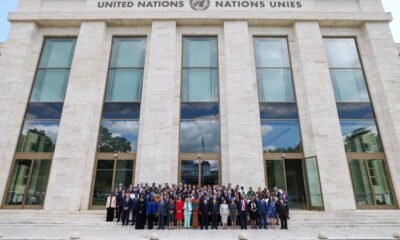
 Politics3 days ago
Politics3 days agoIstanbul to host next year’s inter-parliamentary assembly
-
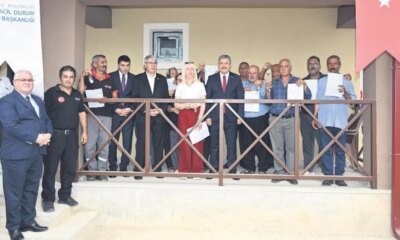
 Daily Agenda2 days ago
Daily Agenda2 days agoNew Nest happiness in Adana and Osmaniye




